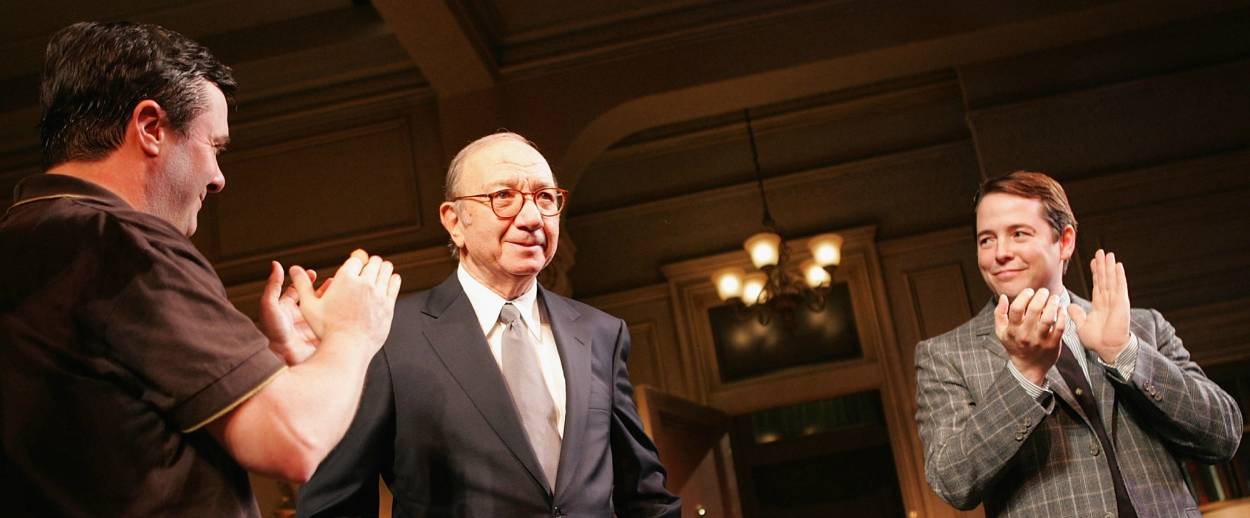Goodbye to the Great Neil Simon
Neil Simon, legendary writer of The Odd Couple and countless other hits, has died at 91. He practically invented the sitcom along the way




On Saturday, Aug. 25th, Sen. John McCain died after a valiant and very public struggle with brain cancer. Plaudits quickly rolled in, praising the late Republican of Arizona for his integrity, his courage, and his commitment to American ideals at a time when whether democracy itself is even a good idea seems to be an open question among his colleagues in the GOP. Whether you loved the man or not, voted for him or not, the general consensus seems to be that his death marks the end of an era.
The following day, the legendary playwright and screenwriter Neil Simon died. At 91, he was 10 years McCain’s senior. The official cause of death was complications from pneumonia but he is also believed to have been suffering from Alzheimer’s disease in recent years. Simon’s life and health struggles in his later years were lived with considerably less attention than what was given to the war hero senator, but with his death no less an era has ended.
The Odd Couple. The Brighton Beach Trilogy. Barefoot in the Park. The Goodbye Girl. The Prisoner of Second Avenue. The Last of the Red Hot Lovers. The Star-Spangled Girl. Plaza Suite. California Suite. The books to musicals like Promises, Promises and Sweet Charity. Neil Simon’s body of work is so massive, his string of hits so dizzying that you can’t quite believe he wrote them all, and always seem to be forgetting one (The Sunshine Boys!I forgot The Sunshine Boys!).
From the moment he got his start, along with every other funny Jewish boy in America—Mel Brooks, Carl Reiner, his older brother, Danny—Simon was an extraordinarily prolific writer, churning out plays and screenplays at an incredible rate that were almost universally beloved by his audiences. For the most part, those audiences were precisely the sort of people Neil Simon wrote about: upwardly mobile urbanites, spiritually, if not technically, New York Jews. These were people still close enough to their humble immigrant roots to enjoy having them mined for earthy humor, but comfortably assimilated out of the probability of anything truly horrible happening.
Perhaps for this reason, Simon, despite having a Broadway theater named after him in 1983—a tremendously rare honor, particularly for someone who was still very much alive—has never been the most fashionable or critically acclaimed of playwrights. He was, as the critic Clive Barnes once wrote, “destined to remain rich, successful, and underrated.” He wasn’t a political writer or an experimental one. And despite the mark made by his autobiographical Brighton Beach Trilogy, the most significant work of his later career, which would make a star of the young Matthew Broderick, he wasn’t even a particularly personal writer. But his work—warm, comical, and always brilliantly crafted—reminds me of what the Japanese architect Yoshio Taniguchi said to the trustees of the Museum of Modern Art about his plan for their new building: “Raise a lot of money for me, and I’ll give you good architecture. Raise even more money, and I’ll make the architecture disappear.”
Neil Simon had a lot of money, and made a lot of money for a lot of people, and perhaps the freedom from worrying about the next hit, the next job, the next time he would be able to convince some schmuck investor to put up the cash for his next play, allowed him to ply his trade with such effortlessness, to blithely populate his plays with funny and pleasant eccentrics and hucksters and mensches and mothers who were always ready with a one-liner, an escapade, and a flawless emotional turn. But just because it seemed easy didn’t mean it was, or that it wasn’t influential.
Think about it this way: There aren’t a lot of MFA students in playwriting these days talking about how they want to be the next Neil Simon. But without The Odd Couple, or The Last of the Red Hot Lovers, or The Goodbye Girl, or all those other enchanting, thoroughly entertaining stories about mismatched groups of people being thrown in apartments and hotel bars together and forced to somehow reckon with each other’s shared humanity, there would be no sitcoms. No Friends. No Seinfeld. No Golden Girls. No Cheers. No New Girl. Set The Unbreakable Kimmy Schmidt in the ’70s and cast Carol Kane as Kimmy instead of the landlady and you’ve got a Neil Simon play. Seriously. Neil Simon invented the dominant form of American comedy, without anyone watching it at home ever quite realizing he was there. It truly is the end of an era. And like the death of his compatriot McCain, nobody is really quite sure what the hell is going to come next.
Rachel Shukert is the author of the memoirs Have You No Shame? and Everything Is Going To Be Great,and the novel Starstruck. She is the creator of the Netflix show The Baby-Sitters Club, and a writer on such series as GLOW and Supergirl. Her Twitter feed is @rachelshukert.